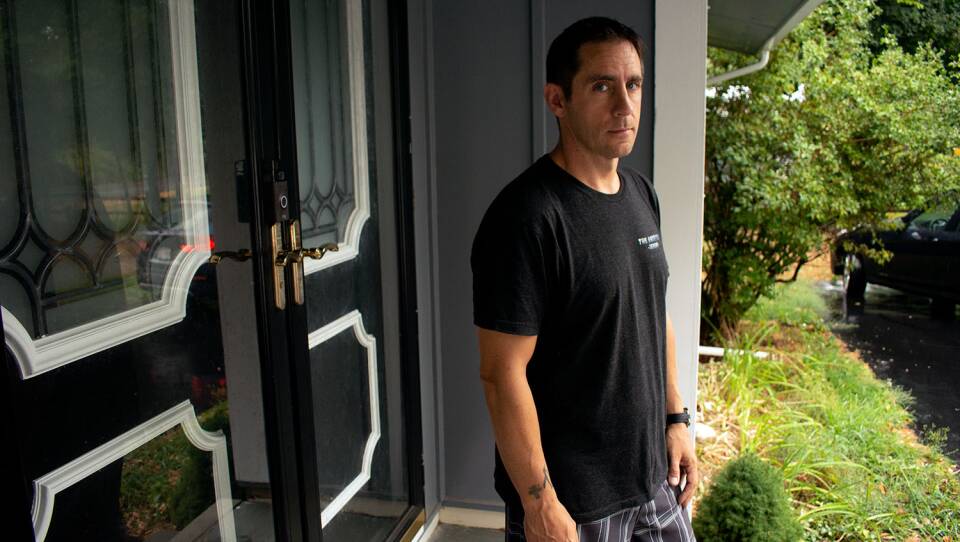Updated at 12:03 p.m. Sept. 6
After retiring from the military in 2020, Jeremy Standring wanted to expand the photography business he operated out of his South Hamilton garage. But the COVID-19 pandemic dried up his customer base. So the 43-year-old Coast Guard veteran thought he’d get ahead by enrolling at Bay State College to study digital marketing.
“I needed a way to market my business over the next two years, so that when the pandemic is over I can come back strong,” he said.
That plan didn't pan out. Standring said his marketing courses at Bay State were suddenly canceled because there weren't enough teachers. (The college's interim president said every student "has access to a full-time schedule" in their program.) The college was then put on probation by accreditors over the summer. And Standring said he got little help from a revolving door of employees at Bay State, a school that costs about $50,000 a year before financial aid.
"Every other email that I would get would be from a different academic or financial advisor,” he said. “They were going through those guys like [Fruit] Stripes gum."
While President Joe Biden's administration announced sweeping student debt cancellations for millions of borrowers, including thousands here in Massachusetts, the plan looks backward — not ahead. Student advocates worry federal and state education officials are still not doing enough to protect students like Standring from enrolling in financially unstable colleges.
They also say a bill Massachusetts Gov. Charlie Baker signed three years ago requiring colleges to be more transparent has done little to protect students and local communities from abrupt college closures and to restore public trust.
Eileen Connor, president of the Project on Predatory Student Lending, said what lawmakers call the "early warning" bill doesn’t live up to its nickname.
The law requires colleges to alert the state Board of Higher Education if it does not have enough funds required to operate for 18 months, according to Massachusetts Higher Education Commissioner Carlos Santiago. It also requires colleges to present a “closure plan” to the state that outlines how it would notify students and staff, as well as help students arrange transfers to other colleges. The state can review a college's finances prior to 18 months, but they are promised confidentiality, so consumers have no way of knowing a school’s viability.
Connor said state education officials should be able to sound the alarm about a college’s financial problems earlier, especially when institutions cost tens of thousands of dollars.
"It's going to save a lot of people a lot of heartache and wasted time and money," she said. "How many people are going to waste their time on things like GI Bill benefits — things that just can't be recouped — when the inevitable happens?"
State education officials counter that an earlier warning could hasten the demise of a college already on shaky footing.
"If you come out and say an institution is in trouble, it's going to be in greater trouble once it becomes public,” Santiago said. “What is of value to these students is to know that they can continue their education elsewhere without loss of time, without loss of credits."
Santiago leads the small team that monitors colleges' finances under the law. Since 2014, 26 colleges in Massachusetts have closed or merged. That includes Mount Ida College in Newton, where the sudden closure in 2018 left students and families scrambling.
Since the law passed, there have been no other abrupt closures like what occurred at Mount Ida. That’s proof that the legislation works, Santiago said.
"Students are certainly more protected now than they were before,” he said. “It's not going to work one hundred percent every time, but it's worked pretty well up until now."
Santiago would not disclose whether his team is monitoring Bay State College, citing the law's strict confidentiality provisions.
Here's what we do know about Bay State:
- Over the past twelve years, its enrollment has plummeted from more than 1,200 students in 2010 to about 300 last spring.
- Five years ago, the college wasbought byAmbow Education, a Chinese holding company. Since then, Ambow has absorbed millions of the college's expenses.
- In 2020, Bay Statereceived a pandemic-related federal loan totaling more than $1.4 million.
- A year later, the Department of Higher Education approved a new master’s degree program in business analytics, which, Mason said, hasn’t launched yet.
- This summer, Bay State's accreditor placed the college on probation over financial and staffing concerns. (The college is not among the schools placed on heightened cash monitoring by the U.S. Education Department.)
Jeff Mason, interim president of Bay State, blames demographic shifts and the pandemic for the declines.
“There was a decrease in enrollment that we suffered along with other schools, but then COVID occurred and we were as vulnerable as anybody," he said.
Asked where the college would be without that support, Mason said Ambo has been “just tremendous in its support for the college, both in terms of financial support but also in terms of giving us the logistical support and the autonomy to run the college as it should be run.”
But the college has also faced allegations that it misled students about its academic programs. Two years after the sale, Bay State paid more than a million dollars to settle the false advertising claims filed by the Massachusetts attorney general’s office.
Mason said he is optimistic that the college is on the rebound, with incoming first-time student deposits up more than 40% over last year.
"This is the momentum of a ship moving through water,” Mason said. “At first, it was very slow to reach 25 knots, but then once it does reach 25 knots it's got a lot of momentum behind it."
For Coast Guard veteran Jeremy Standring, the effort to turn the ship around is coming too late.
He says Bay State didn't offer any classes in-person or online that he could take for his digital marketing program.
This spring, he got an email saying that because he failed to register for online summer classes he had been automatically dis-enrolled.
"They kicked me out,” he recalled. “They didn't enroll me in classes that they didn't [expletive] have and said 'bye.'"
GBH also spoke to ten other students and former faculty and staff at the college who did not want to be identified but cited problems and concerns similar to Standring's.
Bay State’s interim president Jeff Mason defends the quality of the college's academic program, calling it "very attractive."
This semester, Standring is going elsewhere. He has enrolled in a nonprofit online college based in Iowa. He says the Department of Veterans Affairs told him it will take at least six months to transfer his GI benefits.
In the end, he might end up with a tuition bill.
Correction: An earlier version of this story mischaracterized Jeremy Standring’s age. He’s 43.








